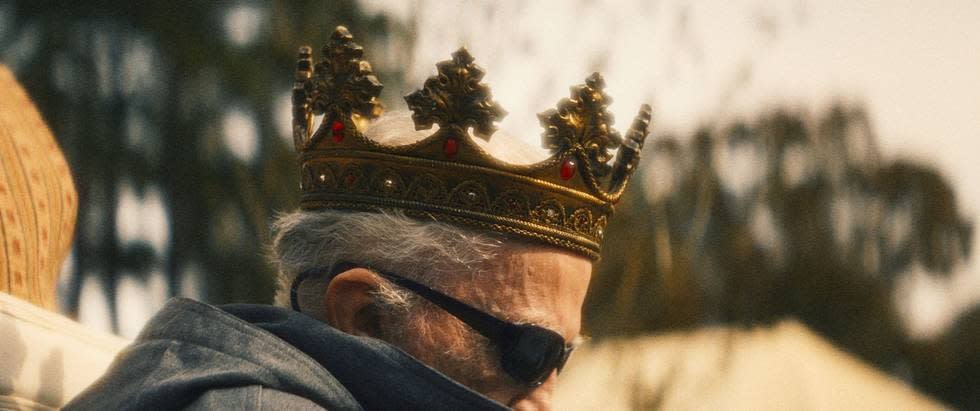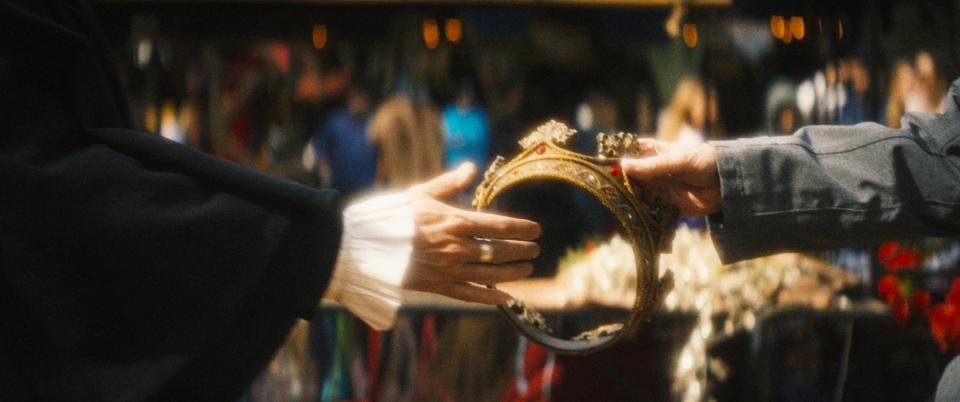‘Ren Faire’ Director Didn’t See His Game of Thrones Ending Coming — Now, He Sees It Was Obvious

[Editor’s note: The following article contains spoilers for the ending of “Ren Faire.”]
It didn’t take director Lance Oppenheim long to realize his three-part docuseries about the Texas Renaissance Fair would become a succession drama. He was drawn to the project by the story of King George Coulam, a man who built this empire of make believe, which he ruled like an emperor: playing corporate overlord, elected mayor, and cosplay king of the festival and town he built from scratch. With Coulam being 86-years old and experiencing some health issues, Oppenheim knew there was at least the potential of a Game of Thrones-like storyline when he started making “Ren Faire.”
More from IndieWire
“I knew that the succession idea was existentially in the air,” said Oppenheim. “And by the end of our first shoot, like seven days into this, I had met everybody already, and knew fairly quickly, especially compare to previous projects, what this would be about.”
Oppenheim said that while filming “Ren Faire” it became clear what started off as a comedy was becoming a tragedy, but while in the thick of the unfolding story he did not see the drama’s inevitable conclusion and believed Coulam was on the verge of selling.
“Because I was in so deep with everyone, with George, with Jeff [the fired general manager], with Darla [the former elephant trainer turned general manager], with Louie [the kettle corn king trying to buy the festival], I really thought that the deal that Darla was lining up [with ‘The Greeks’] in the third episode was going to happen,” said Oppenheim.
This was also an incredibly stressful time for Oppenheim. While he was trying to capture the answer to the succession question, he was now filming the end of his third festival (the Texas Renaissance Fair runs eight weekends every year, from November to January) and nearing a 100 days of shooting. And just like we watch Darla, Jeff, and Louie experience, every time the director thought the question was about to be settled, there would be another twist. As a deal seemed potentially imminent, Oppenheim’s producers and HBO asked him to game-plan how he was going land the film.
“We had to chart out, ‘here are the plans,’ either, like, this could keep going for forever, in which case everyone will lose, and the cycle will continue, or there will be a new episode,” said Oppenheim. “It was extremely stressful because it was like, ‘Are we going to have to ask for more resources to keep going? Am I gonna get fired off of this thing?’ Because people are gonna think, I love shooting so much. Whereas in reality, I was just hoping that time would reveal the answers to all of our questions.”
Oppenheim credits his editors Max Allman and Nicholas Nazmi, who also received producing and writing credits on the film, for helping him keep a wider perspective on the story. And like with all great tragedies, in retrospect the “Ren Faire” conclusion was self-evident: King George was never going to step aside, and there was a long history that pointed to this.
“Glenda, the fairy godmother, in the first episode, says, ‘Do you know how many people thought they were going to take over and now they’re out?’” said Oppenheim of the scene Allman and Nazmi very purposely planted in the first 15 minutes of the series while establishing the world of “Ren Faire.” “And that’s why it’s a game. The institutional memory of the place, for those that are playing George’s game, no one remembers these things except for the really old-timers, who have been burned enough to know now that the game is not worth playing, you win by forfeiting.”

Oppenheim was aware of the history. For example, the meeting between George and Louie at the end of Episode 1 — where it looks like Louie might buy the festival, and sets into motion the second act of the succession drama — that same meeting between the two men has happened every year, like clock-work. In fact, Oppenheim admitted he didn’t even have cameras rolling for the meeting at the end of Episode 1 (he was off filming Jeff in Germany), he ended up using footage from the George-Louie meeting that took place the following next year.
But knowing that history is different than experiencing it. Until someone bares witness up close to the psychology of Coulam when he is on the verge of losing the throne, it’s possible to believe, Well, it’s really different this time. It’s the same way “Succession” creator Jesse Armstrong sucked us into four seasons of believing Logan Roy (Brian Cox) might really exit his media empire, but when push-came-to-shove, Roy grasped his crown until his dying breath. Oppenheim recalled witnessing the same thing with Coulam, as he became more petulant and mercurial as potential deals drew nearer.
“The other side of him would come out, this mean streak, where he would be very cruel to people. And so then I was thinking [about] the question [George] posed to us right at the very beginning, when we first met him, ‘What is a King without his kingdom?’” Said Oppenheim. “It seemed like he was actively fighting himself. He didn’t want to admit it, but that was the thing that I think he was experiencing: ‘Why do I need this so much?’ And I think for George, the answer is pretty apparent: without any of these people to control, ’Is there a meaningful way to live? Is there a way to be bigger than life?’”
Oppenheim is now convinced, and “Ren Faire” certainly makes the strong case, that Coulam will rule the Texas Renaissance Fair until he dies. The filmmaker remarked how surprised he was that his series started to mirror dimensions of “King Lear.” But he doesn’t point to fictional stories, but rather sees Coulam as part of a larger pattern happening across the U.S.

“It’s a story that is so classically American and extremely contemporary to our period of time. It’s not about Renaissance festivals, it’s about what happens when you’re of advanced age and you have accumulated so much power and you have created this massive, amazing, successful business. At what point can you let yourself give it up? And is there anyone that will ever regain or capture the same magic that maybe you once brought to that institution?,” said Oppenheim. “And I’m looking around, and I see it in almost every nook and cranny of American culture.”
Oppenheim draws the obvious connections: Trump versus Biden for President, Robert Iger coming back to Disney, Lorne Michaels’ reign at “Saturday Night Live,” Ray Dalio at the world’s largest hedge fund, Bridgewater.
Oppenheim doesn’t know what it says about our times, but he was thankful that Coulam was invested enough in his own legacy that he was was willing to relinquish enough control to let Oppenheim and team tell his story, and opened his doors to more personal aspects of his life.
That does not mean Coulam was an easy subject. As the series establishes, the King’s time is valuable, and he didn’t always have the patience for Oppenheim’s interest in capturing expressive and cinematic interpretations with his camera.
“It would always be, ‘Get your ugly ass in here, shut up and sit down, get your cameraman in, get the microphone on me, and let’s go,’” said Oppenheim, mimicking the gruff Coulam. “And so if we were moving too slow, or if I was trying to find a shot, or there’d be times where I was just getting into the flow of something, and he’d say, ‘You know, you’re done,’ and ‘I’m like, okay, well, how about tomorrow? We have that in the books, right?’ ‘No, we’ll do it next year.’ I’m like, ‘George, next year, I got a project to make, man. What are you talking about?’”
Still, Oppenheim felt the need to honor Coulam’s willingness to reveal his mean streaks, his penchant for young women, and other aspects of his life that may be deemed embarrassing.
“The easiest thing you can do as a documentarian is make someone appear foolish,” said Oppenheim, paraphrasing the great nonfiction filmmaker Frederick Wiseman. “Wiseman says don’t do that, make people appear noble and/or complicated, show them for who they are, and I hope I did that.
Episodes 1-3 of “Ren Faire” are available to stream on Max.
Best of IndieWire
Sign up for Indiewire's Newsletter. For the latest news, follow us on Facebook, Twitter, and Instagram.
Solve the daily Crossword

